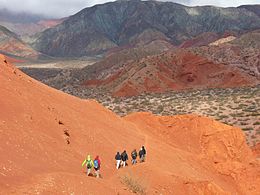Adventure travel is a type oftourism, involving exploration ortravel with perceived (and possibly actual) risk, and potentially requiring specialized skills and physical exertion. Adventure tourism has grown in recent decades, as tourists seek different kinds of vacations, but measurement of market size and growth is hampered by the lack of a clear operational definition. According to the U.S. based Adventure Travel Trade Association, adventure travel may be any tourist activity, including two of the following three components: a physical activity, acultural exchange or interaction and engagement with nature.
Adventure tourists may be motivated to achieve mental states characterized asrush or flow,[1] resulting from stepping outside of their comfort zone. This may be from experiencing culture shock or through the performance of acts, that require significant effort and involve some degree of risk (real or perceived) and/or physical danger (See extreme sports). This may include activities such as mountaineering, trekking, bungee jumping, mountain biking, canoeing,rafting, zip-lining, paragliding, and rock climbing. Some obscure forms of adventure travel include disaster andghetto tourism.[2] Other rising forms of adventure travel include social andjungle tourism.
Access to inexpensive consumer technology, with respect to Global Positioning Systems, flashpacking,social networking and photography, have increased the worldwide interest in adventure travel.[3] The interest in independent adventure travel has also increased as more specialist travel websites emerge offering previously niche locations and sports.
Types of adventure travel
Accessible tourism
Main article: Accessible tourism
There is a trend for developing tourism specifically for the disabled. Adventure travel for the disabled has become a $13 billion USD a year industry in North America.[4] Some adventure travel destinations offer diverse programs and job opportunities developed specifically for the disabled.[5]
Cultural tourism
Disaster tourism
Main article: Disaster tourism
Disaster tourism is the act of traveling to a disaster area as a matter of curiosity. The behavior can be a nuisance if it hinders rescue, relief, and recovery operations. If not done because of pure curiosity, it can be cataloged as disaster learning.
Ecotourism
Ecotourism is now defined as "responsible travel to natural areas that conserves the environment, sustains the well-being of the local people, and involves interpretation and education" (TIES, 2015). Education is meant to be inclusive of both staff and guests.
Ethno tourism
Ethno tourism refers to visiting a foreign location for the sake of observing the indigenous members of its society for the sake of non-scientific gain. Some extreme forms of this include attempting to make first contact with tribes that are protected from outside visitors.
Two controversial issues associated with ethno tourism include bringing natives into contact with diseases they do not have immunities for, and the possible degradation or destruction of a unique culture and/or language.[6]
Extreme tourism
Main article: Extreme tourism
Ghetto tourism
Main article: Ghetto tourism
Jungle tourism
Main article: Jungle tourism
Jungle tourism is a rising subcategory of adventure travel defined by active multifaceted physical means of travel in the jungle regions of the earth. Although similar in many respects to adventure travel, jungle tourism pertains specifically to the context of region, culture and activity. According to the Glossary of Tourism Terms, jungle tours have become a major component of green tourism in tropical destinations and are a relatively recent phenomenon of Western international tourism.
Overland travel
Main article: Overland travel
Overland travel or overlanding refers to an "overland journey" - perhaps originating with Marco Polo's first overland expedition in the 13th century from Venice to the Mongolian court of Kublai Khan. Today overlanding is a form of extended adventure holiday, embarking on a long journey, often in a group. Overland companies provide a converted truck or a bus plus a tour leader, and the group travels together overland for a period of weeks or months.
Since the 1960s overlanding has been a popular means of travel between destinations across Africa, Europe, Asia (particularly India), the Americas and Australia. The "Hippie trail" of the 60s and 70s saw thousands of young westerners travelling through the Middle East to India and Nepal. Many of the older traditional routes are still active, along with newer routes like Iceland to South Africa overland and Central Asian post soviet states.
Urban exploration
Main article: Urban exploration
Urban exploration (often shortened as urbex or UE) is the examination of the normally unseen or off-limits parts of urban areas or industrial facilities. Urban exploration is also commonly referred to as infiltration, although some people consider infiltration to be more closely associated with the exploration of active or inhabited sites. It may also be referred to as "draining" (when exploring drains) "urban spelunking", "urban caving", or "building hacking".
The nature of this activity presents various risks, including both physical danger and the possibility of arrest and punishment. Many, but not all, of the activities associated with urban exploration could be considered trespassing or other violations of local or regional laws.



Jungle tour is one of the best tour which decrease the gap between you and nature if you want to go for a long jungle tour so visit on- Corbett National Park
ReplyDelete